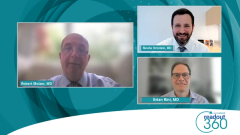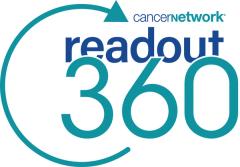
Cabozantinib Plus Nivolumab and Ipilimumab for Advanced Non-Clear Cell RCC
Experts discuss recent data on a triplet combination therapy for patients with advanced non-clear cell renal cell carcinoma.
Episodes in this series

Robert Motzer, MD: So, let's go one step further. There was another trial that was really quite interesting that was a triplet, and then maybe we'll ask Dr Rini his impression on that. So, this was also a single-arm, single-center trial looking at the triplet, which had been reported just recently in the COSMIC-313 study. And so, this was a study that was done at Dana-Farber that looked at cabozantinib with ipilimumab and nivolumab for four doses, and then cabo/nivo following that and, next slide. So, in this study, the results that were reported from the 39 patients was a median progression-free survival of about 12 months for this particular combination. And again, there were very few survival events that were noted since this was reported really quite early. Next slide. I think one of the aspects of this that was quite striking in review of the poster discussion was the lack of tolerability for this triplet in this combination. And a point of fact, the response rate for the various tumor types was actually lower than that, which we've seen with the cabozantinib/nivolumab or lenvatinib/pembrolizumab. And Dr Rini, I don't know what your take was on this particular triplet and how it affects the field and whether this is something that should be followed up on.
Brian Rin, MD: I think this story of cabo/nivo in non-clear cells is the same as clear cell, and that you have pretty significant toxicity that's limiting therapy delivery, and you're not seeing the punch that you hope for. The cabozantinib/nivolumab and lenvatinib/pembrolizumab data you just presented look better than this. And again, it's cross trials and small numbers and all that, but you're not getting- adding in that third drug gets you more toxicity and doesn't get you benefit. So, I don't really see a future for this particular triplet in clear cell or non-clear cell. Doesn't mean that every triplet is doomed, but it just means this initial attempt was a bit toxic, and we're going to have to be a little more thoughtful with how we layer them in, how we select patients, other mechanisms as is being studied in clear cell. But I think doubled data is very exciting, and I agree with Moshe that that's what I give my patients. I give them my IO-TKI. And I think either cabozantinib/nivolumab or lenvatinib/pembrolizumab are reasonable and they have the strongest data, whatever you're comfortable with. I don't give single agent TKI. I just think patients, even if they're less immune or irresponsive, deserve that upfront immune therapy where we know it works best and the biggest chance of durable response.
Robert Motzer, MD: So, it sounds like the doublet therapy, the cabozantinib/nivolumab and lenvatinib/pembrolizumab is practice changing in this rare subset of tumors, but the message to the community oncologist is don't use the triplet.
Brian Rini, MD: I think that's fair.
Robert Motzer, MD: There was an abstract in terms of the real-world data to follow these trials in non-clear cell RCC from the International Metastatic Renal-Cell Carcinoma Database Consortium or the IMDC. Dr Rini can you tell us about this data and your thoughts on it?
Brian Rini, MD: So, this was a look at the IMDC database, which we've talked about. [Dr] Chris Labaki presented this. He won an ASCO Merit Award, if I remember correctly, in the poster discussion. So, this is a look back at the database. We've said that sarcomatoid is more immune responsive, but that's never really been defined in a non-clear cell population. And so, this retrospective look really gets at that looking at IO-based regimens, either ipi/nivo or IO-TKI, and then looking at monotherapy and looking at standard clinical outcome measures. And what they saw, not surprisingly, is that in the sarcomatoid subset of non-clear cell, which is a very small subset. So, non-clear cells relatively rare, and sarcomatoid non-clear cells rare. So, it takes a big database like this to look at it. You can see advantages to the immune containing regimens. Now, you don't see that for the non-sarcomatoid, non-rhabdoid subsets. Again, it becomes a little difficult when you're comparing subsets from retrospective databases. But to me, this just reinforces that sarcomatoid histology is more immune responsive, and the underlying histology of papillary or clear cell doesn’t matter that much. And I think just reinforce what we said with the previous data immune-based regimens are standard in kidney cancer, and that extends to non-clear cell as well.
Robert Motzer, MD: Well, that was a very informative and comprehensive review of what was new, exciting and some of the more important abstracts at this year's ASCO. And I'd like to thank Dr Brian Rini and Dr Moshe Ornstein for joining me this afternoon for this important overview.
Moshe Ornstein, MD: Thanks.
Brian Rini, MD: Thank you.
Newsletter
Stay up to date on recent advances in the multidisciplinary approach to cancer.





































